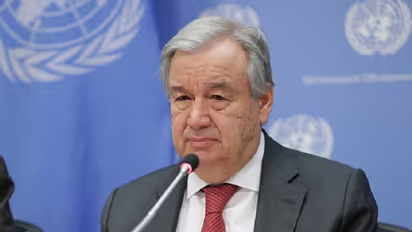Failure to vaccinate will give rise to new variants: UN chief to world leaders in Davos Summit

Synopsis
In his address at the World Economic Forum (WEF) in 2022, Guterres emphasised the importance of increasing the global immunisation push and assisting countries that lack vaccines against the highly infectious virus.
UN Secretary-General Antonio Guterres warned the globe that failing to vaccinate everyone against COVID-19 will result in new coronavirus variations. In his address at the World Economic Forum (WEF) in 2022, Guterres emphasised the importance of increasing the global immunisation push and assisting countries that lack vaccines against the highly infectious virus. "The previous two years have revealed a simple but cruel truth: if we leave anybody behind, we leave everyone behind," he added, issuing a rallying cry to "come together to make 2022 a genuine moment of recovery."
The UN Secretary-General warned that future strains of the virus might bring daily life and economies to a standstill. Guterres asked the international community to deal with the coronavirus problem fairly and equitably. He chastised affluent nations for not vaccinating against COVID, stating that 'shamefully,' immunisation rates in industrialised countries are seven times greater than in African ones.
"If we do not vaccinate everyone, we give rise to new varieties that spread across borders and put daily life and economies to a standstill," the UN Secretary-General bemoaned.
Guterres also expressed worry that the globe is "nowhere near the objectives" established by the World Health Organization, which has called for vaccinating 40% of the world's population by the end of 2021 and 70% by the middle of 2022.
Also Read | India becoming new, attractive investment destination for the world: PM Modi at World Economic Forum’s Davos
The UN Secretary-General asked pharmaceutical firms worldwide to "stand in solidarity with developing nations by sharing licences, know-how, and technology so that we can collectively find a way out of this pandemic." WHO started the UN-backed COVAX initiative in April 2020 in response to the coronavirus pandemic and to push for global equitable access to COVID-19 vaccinations. "COVAX's objective was hampered by hoarding/stockpiling in affluent nations, as well as catastrophic outbreaks that resulted in border and supply closures. In addition, a lack of sharing of licences, technology, and know-how by pharmaceutical firms resulted in idle manufacturing capacity," the agency stated in a statement issued on January 16.
Check the Breaking News Today and Latest News from across India and around the world. Stay updated with the latest World News and global developments from politics to economy and current affairs. Get in-depth coverage of China News, Europe News, Pakistan News, and South Asia News, along with top headlines from the UK and US. Follow expert analysis, international trends, and breaking updates from around the globe. Download the Asianet News Official App from the Android Play Store and iPhone App Store for accurate and timely news updates anytime, anywhere.